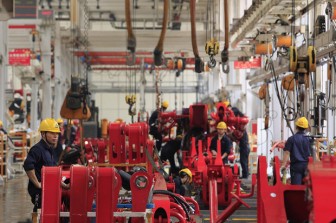
China’s manufacturing expanded for the first time in three months in October, adding to signs growth in the world’s second-biggest economy is rebounding after a seven-quarter slowdown.
The Purchasing Managers’ Index rose to 50.2 in October from 49.8 in September, the National Bureau of Statistics and China Federation of Logistics and Purchasing said today in Beijing. That matched the median forecast in a Bloomberg News survey of 30 economists. A reading above 50 indicates expansion.
Today’s report bolsters hopes for a pickup in expansion this quarter after industrial production, exports and retail sales accelerated in September. The data may also reduce pressure on outgoing Premier Wen Jiabao to roll out more stimulus measures during a once-a-decade power handover that begins with a Communist Party congress next week.
“The growth stabilization is on track on the back of improving domestic and external demand, more accommodative monetary and financing conditions,” Chang Jian, a Hong Kong- based economist at Barclays Plc who formerly worked for the World Bank, said before the release. “Industrial activity and growth momentum are likely to pick up further this quarter.”
Chances of a cut in interest rates or reserve requirements are diminishing, and the government is likely to maintain the current level of monetary and fiscal support to sustain the growth recovery, Chang said.
Earnings Concern
Economists’ forecasts for the PMI October reading ranged from 49.8 to 51.8, according to the Bloomberg survey. The index is based on responses from purchasing managers at 820 companies in 31 industries.
A separate purchasing managers’ index from HSBC Holdings Plc and Markit Economics indicated that manufacturing contracted at a slower pace in October, according to a preliminary reading on Oct. 24. The final number for the survey, which covers more than 420 companies and is weighted more toward smaller businesses, is due at 9:45 a.m. Beijing time.
The Shanghai Composite Index, the country’s benchmark stock gauge, has lost 5.9 percent in 2012 on concern the slowing economy will depress earnings growth.
China’s economy expanded 7.4 percent in the third quarter from a year earlier, the slowest pace in three years.
The People’s Bank of China has paused from monetary easing after cutting interest rates in June and July amid concern that further relaxing policy will lead to rebounds in inflation and property prices.
’Tweaking’ Policy
China’s government won’t provide large economic stimulus and a strong rebound in growth is unlikely even as slowing inflation gives the monetary authority room for “tweaking” monetary policy, Song Guoqing, an academic adviser to the central bank, said Oct. 18.
Industrial-production growth accelerated for the first time in four months in September, retail sales rose at the fastest pace since March and fixed-asset investment expansion quickened, official data showed.
Expansion may rebound to 7.8 percent this quarter, Lu Ting, head of Greater China economics at Bank of America Corp. in Hong Kong, said in a note this week. He raised his estimate from 7.5 percent.
China’s industrial-output growth will be faster this quarter than in the previous three months and help the nation achieve its 7.5 percent target for economic expansion in 2012, Zhu Hongren, spokesman at the industry ministry, said at a briefing on Oct. 25.
Industrial companies’ profits rose in September for the first time in six months, a statistics bureau report showed on Oct. 27, a sign that pressures on corporate earnings are easing.
CSR Corp., China’s biggest trainmaker by market value, on Oct. 25 reported a 21 percent increase in third-quarter profit as rising domestic spending on railways and lower borrowing costs boosted income.
Source: Bloomberg




























